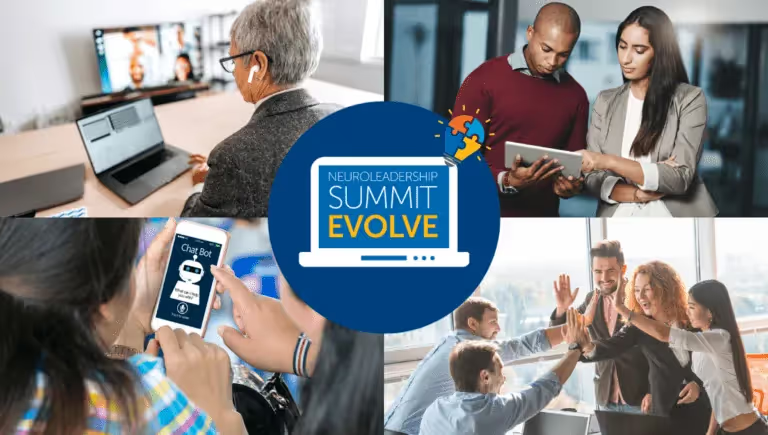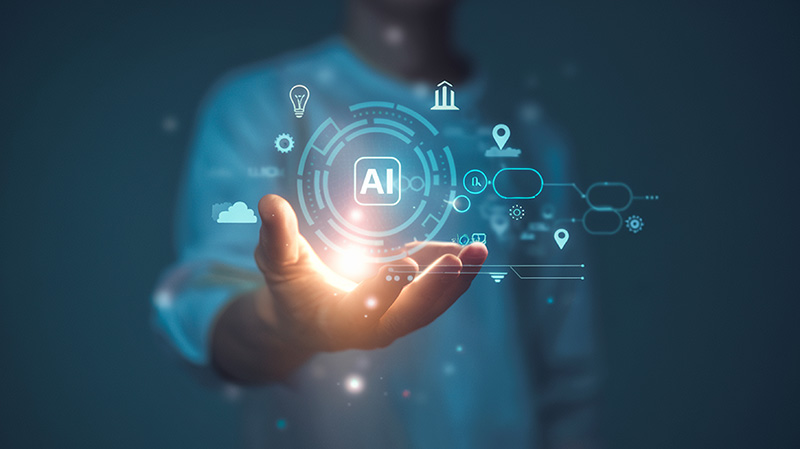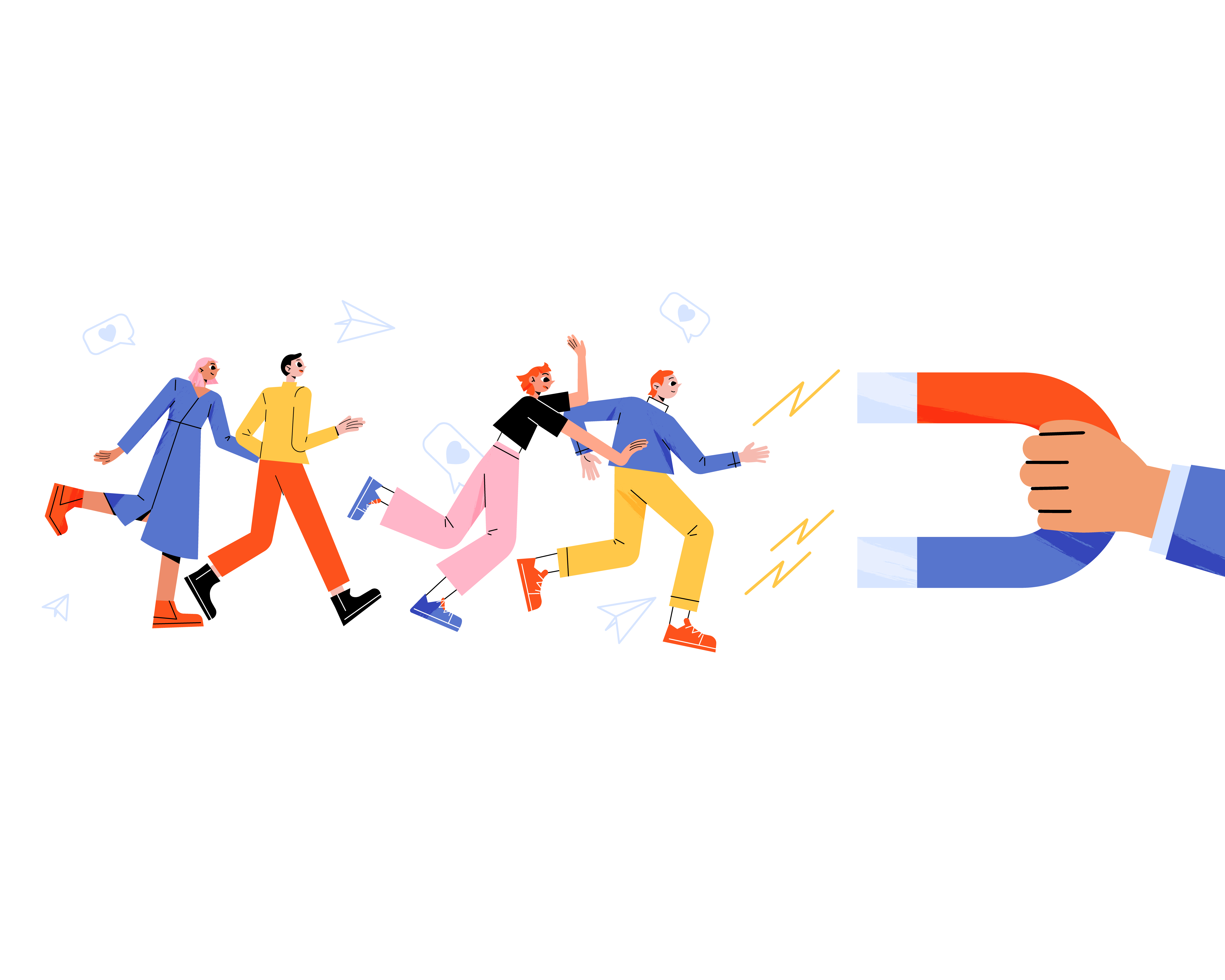Key Insights:• This year’s NeuroLeadership Summit was a two-day global event featuring more than 5,000 virtual participants.• From the dozens of sessions, several major insights emerged as defining themes of the conference.• Leaders can draw on these big ideas to build brain-friendly habits of resilience, creativity, and high performance.
In a two-day, all-virtual global event, this year’s NeuroLeadership Summit explored what organizations need to focus on to stay adaptable — in all facets of business. Topics ranged from leadership development to artificial intelligence and skill-building in an age of rapid change.
More than 5,000 participants attended this year’s Summit, many of them reporting strong insights that changed the way they view their trickiest problems. While there were far too many insights to share in totality, we’ve compiled below the four major themes that emerged from this year’s Summit.
1. Leadership is changing faster than ever
In the keynote session “Leadership Today and Tomorrow,” panelists mulled over a provocative question: What are the most critical skills a leader today must possess? Given that change has accelerated 183% within organizations since 2019, panelists agreed it’s an important question.
Changes are happening faster and faster, and the leader who fails to keep pace risks missing out on critical business opportunities. At least 50% of the skills leaders need today are skills that are brand-new, like managing a hybrid workplace, and the other 50% are skills that were always needed, such as motivating people, but are now more difficult than ever. “Change has never been this fast, and it will never be this slow again,” said Dr. David Rock, NLI co-founder and CEO.
The bright side is that leaders can future-proof their teams by anchoring on three core competencies: growth mindset, psychological safety, and accountability.
Together, these concepts support teams in striving for healthy and resilient performance. Growth mindset nudges them toward experimentation but readies them for failure. Psychological safety keeps team members engaged and trusting of one another. And accountability keeps the objectives clear and present throughout the process.
There will never be a silver bullet for managing rapid change, but with a focus on brain-friendly principles, leaders can keep winning in any climate.
2. Everybody needs the same core skills, but there’s a catch
A long-held assumption in leadership development is that leaders need different skills depending on their place in the hierarchy. The C-suite requires one set of skills, while middle managers need a second set, and front-line leaders still others. The science of learning challenges this assumption.
In the keynote session “Challenging Conventions – Leadership Development,” panelists discussed the major obstacles organizations face around upskilling leaders. One big insight was that people who learn the same material together tend to reap more benefits in the long term than people who learn different material at different times.
What this means is that instead of a top-down approach, organizations should embrace an everyone-to-everyone model, which encourages greater sharing and insight generation. The catch, however, is that leaders need to apply the skills in different ways that are unique to their roles.
For example, all leaders benefit from learning the skill of empathy. But a front-line leader will use empathy differently than a CEO — say, in a weekly check-in meeting versus understanding a board member’s concerns on business strategy. While these applications may differ, research suggests the skill-building will be richer if it’s consistent across the organization.
3. Don’t let AI steal your opportunities for insight
With artificial intelligence playing a greater role in business every day, how can AI help employees become more creative and innovative?
In the keynote session “Innovation and Creativity in the Age of AI,” panelists discussed how creativity works in the brain and how AI can either hurt or help people be more creative based on their natural wiring and how they use it. In short, AI is a wonderful aid when it comes to exploring our own ideas, but for learning to take place, we shouldn’t be so quick to ask AI to give us the moment of insight. We must still have the “aha” moment ourselves.
The reason is creativity and learning are intimately linked. Connecting the dots and building new layers of knowledge allows us to be more creative — to connect even more dots. But if AI does all of the dot-connecting for us, we leave moments of learning on the table. We also rob ourselves of the powerful motivation to act that having our own insights provides.
The takeaway: If organizations want to become more innovative, they should encourage employees to prompt AI to help them explore a topic and offer feedback on their own ideas rather than simply asking for the solution.
4. Proactive accountability creates high performance
The final session of this year’s Summit was “Thrive Through Uncertainty,” and perhaps the biggest insight was around accountability — namely, the difference between the all-too-common punitive accountability, where people are told to perform or else, and the more helpful proactive accountability, where leaders set the right expectations ahead of time.
In the years following the pandemic and rapid social change, leaders are struggling to balance the needs of their people with demands of productivity. In reality, this is a false dichotomy. A major need of employees is clarity in expectations of performance.
Proactive accountability, our research suggests, comes down to three cognitive skills: sync expectations, drive with purpose, and own your impact. Generally speaking, these three habits describe a team where leaders communicate goals clearly, role model following through, and use a growth mindset to recover from failures or setbacks.
True to the session’s title, these habits support teams as they look to navigate uncertainty while striving for high performance. With the right skills to focus on what matters and the safety nets that keep teams resilient when things go haywire, every leader and organization can adapt and evolve.






.avif)

